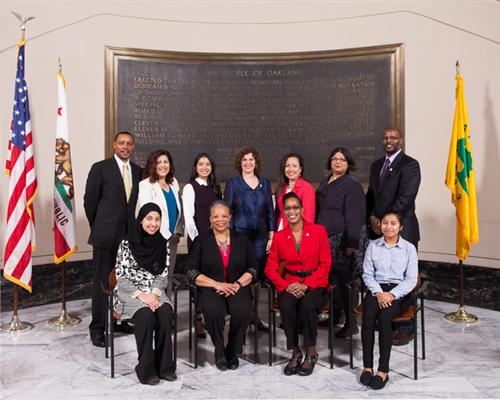Is Representative Democracy Breaking Down at Oakland Unified?
Sep 5, 2015
Posted in Education/Schools/Youth

By Ken Epstein
Local residents are raising concerns about a new set of “meeting procedures” and “meeting norms” dictating the behavior of the Oakland Board of Education, which could limit board members’ ability to lead the district, as they were elected to do.
Some of the norms and procedures, adopted unanimously by the board and implemented at last week’s meeting, might sound innocuous, though they have a paternalistic air that does not seem appropriate to a body that is elected to set policy that is supposed to represent the beliefs and needs of Oakland residents.
“Five minute speaking limit, no mingling with the audience, focus on agenda items, always be respectful, no interruptions, model desired behavior, no personal attacks,” says the list says, along with “honor the time, no sidebars, technology aligned to meeting purpose.”
However, at least one of the norms for board members has members of the community worried.
“Act as a collective body – honor confidentiality.”
This is a norm that appears on its surface to call on board members to close ranks, refrain from publically disagreeing with each other or the administration and avoid revealing too much about district proposals. But the Board is responsible for setting policy for the district and California law requires that those policy discussions be held in public

Recognizing the public’s concerns, School Board President James Harris said the changes are not designed to limit transparency or stifle the voice of elected officials but to guarantee that meetings are conducted legally and with civility.
“Some things are confidential to board members, such as closed session things,” said Harris. “We’ve had a few board members break those rules. You’ve got to respect the laws.”
Additionally, he said, “You don’t want personal attacks on board members,” he said. “We all need to get better. We need to be better communicators. “
However, there are community members who see this new policy as symptomatic of a school board that has lost its sense of responsibility as an elected body and generally passively follows the lead of the latest superintendent and his team of administrators
The problem goes back to Oakland’s loss of local control of the school district in 2003 when the district went bankrupt and took a $100 million state loan, still not repaid.
The State Supt. of Instruction installed a trustee, Randy Ward, who ran the district singlehandedly. Working closely with a team of administrative advisors from Bakersfield, Ward fired principals and veteran administrators, in one shot eliminating much of the district’s diversity and the historical memory of the institution.
Over the course of the years, despite the return of local control to the school district in 2009, the balance of power has continued to shift away from the board and toward the administration.
The attorney for the district used to be an employee of the board, but that has been changed. The attorney now reports to the board and the superintendent.
The board secretary used to be an employee of the board. The superintendent is now the board secretary and sets the agenda of board meetings in conjunction with the board president.
Like the City Council, the board used to have a number of committees, including curriculum, facilities and business and finance. With the committees, board members could gather information, listen to community input and make informed decisions.
Without the committees, they lost their eyes and ears. They were forced to rely on what staff told them at board meetings, along with some one- or two-minute presentations from the public.
In addition, the board several years ago agreed in principle that it would not ask questions or disagree with the administration in public. Instead, individual board members are supposed to ask questions or disagree by email.
As a result, many policy differences among board members never come to public attention.
Though concerns about the board not fulfilling its role as an elected body have been raised under the one-year-old administration of Supt. Antwan Wilson, the same issues existed and were compounded under former superintendents Gary Yee and Tony Smith.
While some on the board are committed to the idea that board members should “not disagree publically on things, I think people should know if we are having disagreement on things. There’s nothing bad about disagreement,” said Boardmember Shanthi Gonzales, who represents District 6.
Another board member, who asked not to be identified, said she and her colleagues were under tremendous pressure not to disagree with each other or with the district staff in public.
Staff also uses pressure to try to silence teachers and students who speak up at meetings, the board member said.
According to Jim Mordecai, a retired teacher who attends and speaks at most board meetings, the erosion of democracy in the Oakland district is also occurring in other school districts around the country, related to growth of corporate involvement and privatization of public education.
Much of the erosion of democracy norms is tied to a variety of corporate reformers, who want to run the school system like their companies, such as billionaire Eli Broad (rhymes with road) and his Broad Foundation and the Broad Academy, where many of the nation’s new superintendents are trained he said.
Oakland’s State Trustee Randy Ward was an early Broad trainee, and he staffed the district with a crew of Broadees.
People coming from the corporate mindset “prefer a board that is just a rubber stamp, “ Mordecai said.
“(But) Some of the women on the board are pretty strong, and sometimes they stand up and fight back,” he said.
But they are still struggling to understand the issues, which are not simple.
“It takes a lot of time to understand,” he said. “It’s complicated. (For example) they don’t come on the board understanding about Broad training.”
Making their job more difficult, he said, Oakland school board members attend retreats where they learn from “experts” that their proper role is to be a cheering team for the administration.
Oakland School board members have attended two trainings by Texas based consultant Don McAdams, who worked for Eli Broad when he was setting up his superintendent academy.
According to critics around the country, McAdams suggests that board members not “interrogate” staffers during board meetings.
Board members are encouraged to vote unanimously, if possible, on important issues, such as school closings and bond proposals, sending a message to the public and workforce that the issue is a done deal, McAadams says in his trainings according to reports.
This approach is deeply flawed says civil rights attorney Dan Siegel, who served on the school board and worked as the district’s general counsel.
“As voters, we’re entitled to hear board members express their best opinions and if they disagree and to make decisions,” he said.
In reality, the board trainings are not neutral but ideological, encouraging the board to get out of the way of the experts, said Mordecai,
“But that’s not the process. The process has to be inclusive of the community. It’s supposed to be a democratic institution.”
The Post is printing this article in response to questions and concerns that have come up in the course of our coverage of Oakland schools. We look forward to publishing your reactions and thoughts on these issues.